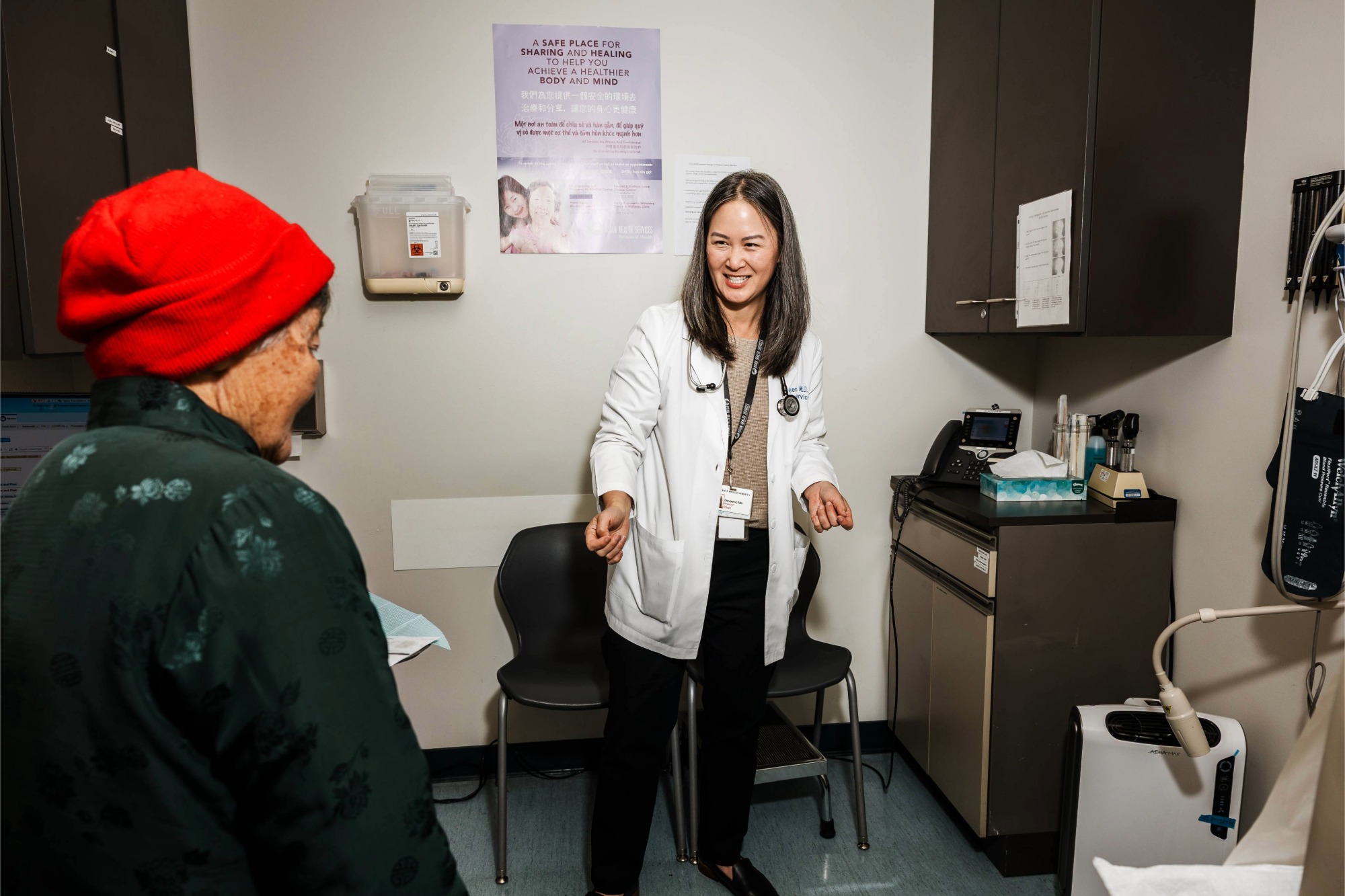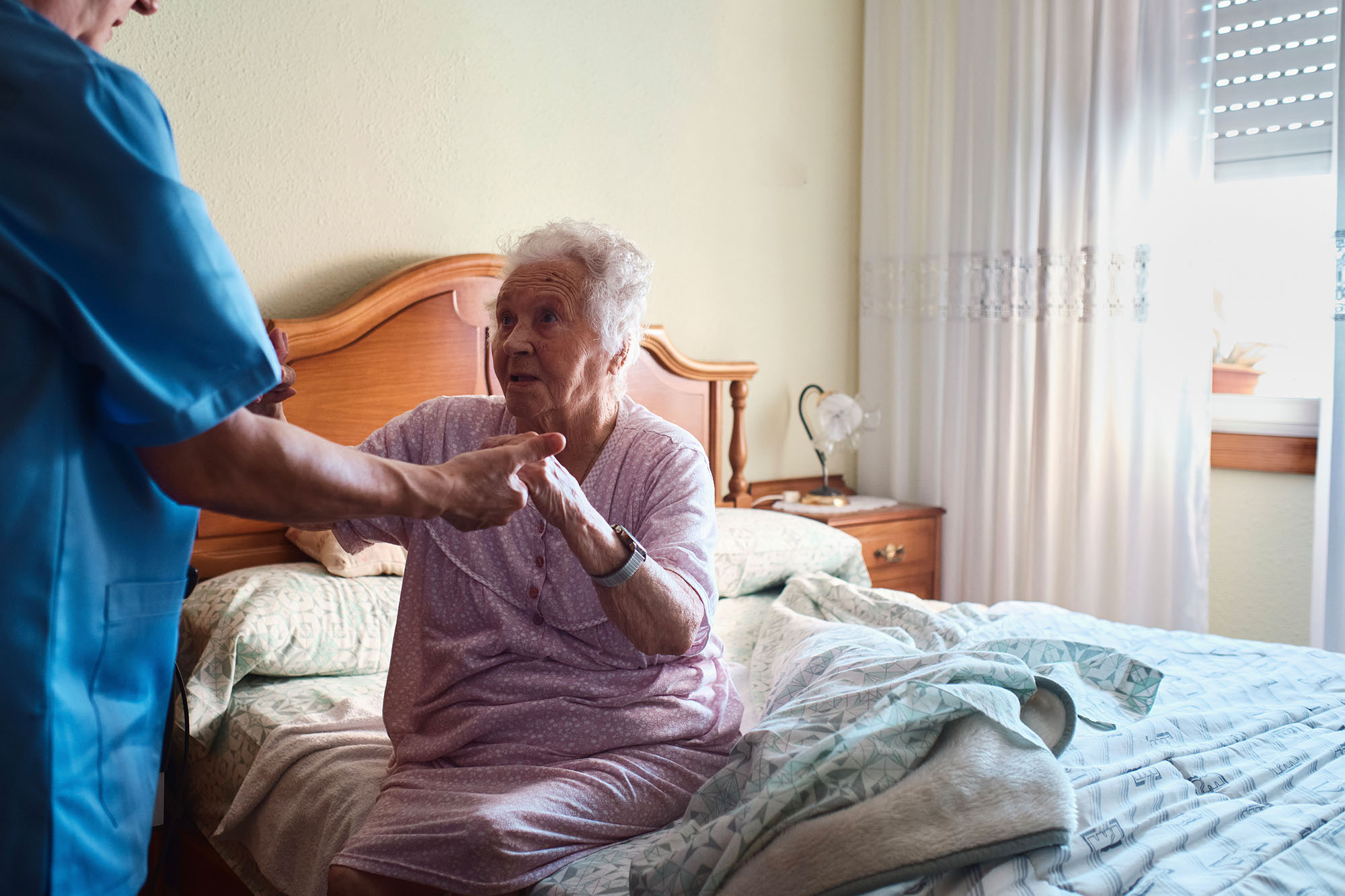The collaboration of dedicated and passionate leaders, learning from one another, has been instrumental in implementing, strengthening, and sustaining inpatient, outpatient, and home-based palliative care across the state.
Peer Learning Communities
Several formal and informal peer learning communities across the state have supported progress. Regular meetings with colleagues doing the same or similar work helped participants see their work as part of a larger system-change effort. It also enabled them to reach out to colleagues for information, problem-solving, and support. The California Health Care Foundation (CHCF) funded learning communities aimed at increasing access to palliative care for the safety net (see “Peer Learning Communities Supported by California Health Care Foundation”). These learning communities contributed to progress by helping participants make the business case for palliative care, track and report operational and outcome measures, and focus on program sustainability.
Peer Learning Communities Supported by the California Health Care Foundation
| date | learning community | contributions to progress |
|---|---|---|
| 2008–13 | Spreading Palliative Care in California Public Hospitals | The leaders of 15 public hospitals developing or expanding palliative care programs participated in a peer learning and support network. Analysis of program structures conducted in 2021 showed that the public hospital services were more interdisciplinary and just as effective as their private hospital peers. |
| 2013 | Palliative Care Action Community | Twenty-one organizations participated in a one-year learning collaborative that supported and strengthened participants’ existing efforts to build effective, sustainable clinic- and home-based palliative care services. Participants shared implementation strategies and experiences with different clinical models, and had access to tools and technical assistance for assessing operational and fiscal outcomes. Analyses of fiscal outcomes for two participating sites led to peer-reviewed manuscripts that helped strengthen the value proposition for such services. |
| 2015–19 | Spreading Community-Based Palliative Care in California Public Hospitals | Leaders and staff from nine public hospitals created a supportive learning environment as five sites established new clinic- or home-based palliative care services and four expanded existing services. Information from program leaders about staffing practices and other processes were shared in a peer-reviewed publication, a significant addition to the literature on safety-net community-based palliative care. |
| 2017–18 | Senate Bill (SB) 1004 Implementation Technical Assistance Series | Medi-Cal managed care plans (MCPs) and home-based palliative care providers engaged in technical assistance and peer learning about developing palliative care partnerships and services before implementation of SB 1004’s Medi-Cal palliative care requirements. Tools and information developed for the series were provided in a PC in Medi-Cal online resource center. |
| 2019–21 | Medi-Cal Palliative Care Community | MCPs and providers responsible for operationalizing SB 1004 were supported with ongoing webinars, an annual convening, and an annual survey. Activities encouraged the spread of promising practices in operationalizing Medi-Cal palliative care as dozens of MCPs and providers gained experience with the benefit. Key lessons were curated in a Medi-Cal PC services online resource center. |
| 2020–21 | Generalist Palliative Care in California Public Hospitals | Nine public health care systems put into practice generalist palliative care interventions including advance care planning, goals of care clarification, pain assessment and management, and end-of-life and comfort care orders. Descriptions of these programs, and resources to support replicating such work, were distributed via a generalist PC online resource center. |
| 2021–23 | Medi-Cal Palliative Care MCP Learning Community | CHCF supported regular webinars and discussion forums for MCPs, annual surveys of MCPs and contracted palliative care providers, and continued the annual convenings of MCPs and contracted palliative care providers. Information shared in these forums supported the spread of promising practices and collaborative problem-solving. |
“When I think about palliative care in California, one of the things that I love most is that it feels that I am part of a community who works together, regardless of what health system we work for, to be able to create better systems to care for patients and families.”
—Matthew Gonzales, MD, Associate Vice President, Chief Medical and Operations Officer, Providence Institute for Human Caring
Payer-Provider Partnerships
Passing SB 1004 was an important step in making palliative care available to Medi-Cal enrollees. By itself, however, it could not ensure health plans and palliative care providers could effectively and collaboratively deliver high-quality services to the people who would benefit from them. Field leaders formed several initiatives that gave health plans (including those not offering Medi-Cal products) and provider organizations support and tools to develop and sustain community-based palliative care (CBPC), including home-based palliative care (HPBC) and outpatient (clinic-based) palliative care. (See “Example California Payer-Provider Partnership Initiatives.”)
Payer-provider partnerships highlighted the importance of open communication between payers and providers and a shared commitment to consistency, quality, and standards in the delivery of effective, sustainable, patient- and family-centered palliative care services.
“I think palliative care has grown in California because there are so many passionate experts and people who really see that this type of care makes a difference.”
—Kim Bower, MD, Medical Director, Blue Shield of California
Example California Payer-Provider Partnership Initiatives
| date | payer-provider partnership | contributions to progress |
|---|---|---|
| 2014–17 | Payer-Provider Partnerships for Palliative Care | Identified practices for payers and providers to maximize effectiveness of health plan–funded community-based palliative care services. Key lessons were distributed via a payer-provider partnerships online resource center. |
| 2016–22 | California Advanced Illness Collaborative | Developed and evaluated a set of standards to facilitate contracting for CBPC services. |
| 2017–19 | Increasing Access to Palliative Care in Rural California | Identified potential solutions for common challenges experienced by health plans and providers delivering palliative care in rural settings. |
Coalitions
Formal, structured coalitions have played a pivotal role in supporting the progress of palliative care in California, including the Coalition for Compassionate Care of California (CCCC), the Chinese American Coalition for Compassionate Care (CACCC), and local collaborative efforts.
Founded in 1998, CCCC’s mission is to promote and enhance quality palliative and end-of-life care in California. Over time, CCCC has adeptly convened a diverse group of stakeholders, ranging from health care professionals to community-based organizations and patient advocates, foundations to policymakers. Serving as the backbone organization for the field in California, CCCC has played a vital role in fostering and facilitating collaboration, learning, and action through peer learning communities, payer-provider communities, policy advancement, and POLST implementation.
Established in 2005, CACCC emerged to address the lack of linguistically and culturally appropriate end-of-life information and training available within the Chinese community. Among other things, CACCC actively promotes advance care planning across California and spearheads hospital-based patient ambassadorship programs in Northern California.
In addition to statewide coalitions, several active local coalitions help drive progress. For instance, the San Diego Coalition for Compassionate Care maintains affiliations with CCCC and the California State University Shiley Haynes Institute for Palliative Care. It conducts monthly member meetings, hosts an annual conference, and provides a speakers bureau for community organizations. Another example is the San Francisco Palliative Care Workgroup, which operates under the San Francisco Department of Disability and Aging. Its membership includes local leaders from various sectors, such as health systems, community-based organizations, payers, family and patient advocates, and foundations. The workgroup developed a strategy for the City of San Francisco to expand palliative care, advocated for a resource directory (currently being implemented), and organized annual advance care planning workshops in commemoration of National Health Care Decisions Day. Notably, the workgroup adopts a community-driven, racial equity lens in its work, as evidenced by its three Learning Journeys with the Black, Chinese, and Latino/x communities.
These statewide and local coalitions mobilize diverse stakeholders and lead initiatives that transcend the scope or capacity of any one organization. Coalitions have played, and will continue to play, a critical role in propelling the advancement of palliative care.
Technical Assistance and Centers of Excellence
State and national organizations established centers of excellence and provided free or low-cost toolkits to help health plans, health systems, and palliative care provider organizations make the business case for, pay for, design, and implement specialist and generalist palliative care services.
In California, CCCC and CHCF have created and distributed multiple toolkits to help all members of the palliative care ecosystem implement generalist and specialist palliative care and advance care planning in multiple settings. Nationally, the Coalition to Transform Advanced Care, the National Hospice and Palliative Care Organization, and the Center to Advance Palliative Care (CAPC) have all created toolkits to help payers and providers design and implement home-based palliative care. CAPC also created multiple tools to help health systems make the case for investing in palliative care more broadly and to help employers and other health care purchasers support palliative care. As of April 2023, 135 California-based organizations have CAPC memberships, giving their employees full access to all CAPC training and tools.
Since 2002 the Palliative Care Leadership Center (PCLC) at UCSF — one of nine such centers launched by CAPC — has provided training and support to health care organizations aiming to establish or expand their palliative care program. Each of the PCLCs across the country provides support for participants to conduct a comprehensive needs assessment and engage in strategic planning to clarify goals, set priorities, and enhance operations, and a year of ongoing mentoring, guidance, and troubleshooting. The establishment of the PCLC at UCSF notably increased access to these supports for California providers. As of April 2023, 134 California-based organizations have completed PCLC training.
Resources from the Field
- Up Close: A Field Guide to Community-Based Palliative Care in California (CHCF)
- Home on the Range: Plans and Providers Team Up to Bring Palliative Care to Rural Californians (CHCF)
- Lessons Learned from Payer-Provider Partnerships for Community-Based Palliative Care (PDF) (CHCF)
- Palliative Care in Medi-Cal (SB 1004) Resource Center (CHCF)
- Community-Based Palliative Care Resource Center (CHCF)
- Essential Elements of Medi-Cal Palliative Care Services (CHCF)
- Tools for Making the Case for Palliative Care (CAPC)
- Palliative Care Resources for Health Plans (CAPC)
- Designing and Implementing Community-Based Palliative Care: A Guide for Payers (PDF) (Coalition to Transform Advanced Care)
- Palliative Care Resources for Employers and Other Health Care Purchasers (Catalyst for Payment Reform)
- POLST Tools and Resources (CCCC)
For full source information, see California’s Palliative Care Evolution — Drivers of Progress in Advancing Palliative Care (PDF).






